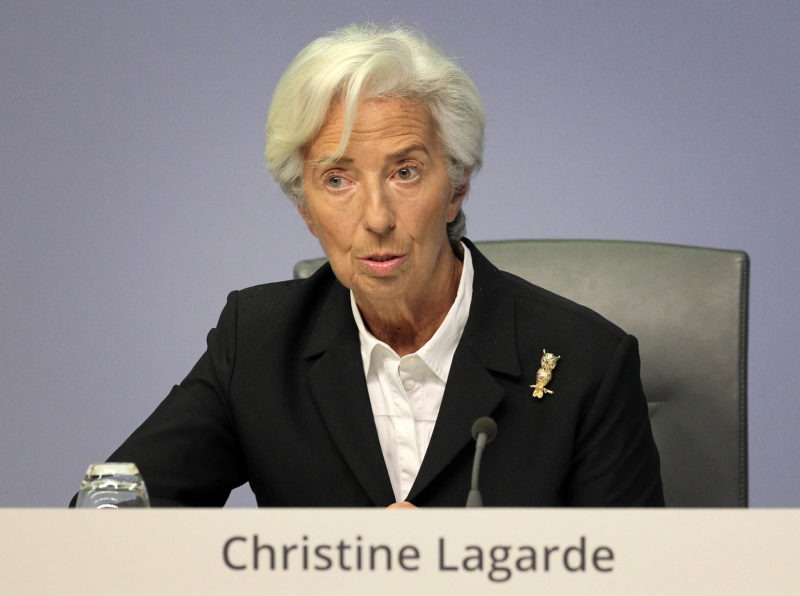ECB’s Lagarde sees ebbing risks to eurozone, vows climate action
Risks have become ‘less pronounced’ (Daniel ROLAND)
Frankfurt am Main (AFP) – European Central Bank president Christine Lagarde was more upbeat Thursday about risks to the eurozone economy, and insisted climate change would be central to a rethink of the institution’s goals and methods.
Risks to the euro area “remain tilted to the downside, but have become less pronounced as some of the uncertainty surrounding international trade is receding,” Lagarde told reporters in Frankfurt.
While an orderly Brexit and a US-China trade truce have cleared some of the air around trade, President Donald Trump raised fears of a fresh row this week when he revived a threat to slap tariffs on European car imports.
But with European Commission president Ursula von der Leyen set for US-EU trade talks in Washington next month, “the tone and the determination on both sides to draw positive conclusions… I think is to be taken as a positive signal,” Lagarde said.
As expected, governors left interest rates at historic lows and maintained “quantitative easing” (QE) bond-buying purchases at Thursday’s meeting, the second chaired by Lagarde since taking the helm in November.
They also officially kicked off a major “strategic review” expected to last all year.
“We will not leave any stone unturned,” Lagarde reiterated, with the primary focus of the rethink how the bank defines its mandate of maintaining price stability, and how best to pursue it.
The institution’s last stock-taking in 2003 took place several years before the global financial and economic crisis forced it into unprecedented stimulus action.
Pressed by reporters on how she sees different aspects of policy developing, Lagarde said it would be “unfair” to preempt the outcome.
“The toughest challenge will be how the ECB communicates (about the review) and the question of how to give a constructive outlet to differing opinions” once it’s over, economist Marcel Fratzscher of German think-tank DIW said.
– Inflation, climate –
In a statement about the ECB’s planned review, the debate around the bank’s inflation target took pride of place.
For most of its active life, the ECB has aimed for inflation “close to, but below two percent” to fulfil its mandate to keep eurozone prices stable.
Over the past seven years, it has failed to achieve that level despite unprecedented policy experiments, including years of negative interest rates and over 2.6 trillion euros of QE.
One option would be to simply target inflation “around” two percent.
The ECB’s monetary policy toolkit and communications were equally prominent in the statement.
Lagarde said the bank would also look closely at the role the ECB could play in tackling climate change — despite objections from the likes of German central bank chief Jens Weidmann to a “green monetary policy”.
Lagarde said she had heard the concerns that climate action could be “a distraction” from the ECB’s main price stability mandate.
But she warned of “the danger of doing nothing”.
“Failing to try is already failing,” she insisted, hinting that the bank could look at increasing the share of “green” investments in its portfolio.
Analysts from Capital Economics were unconvinced. “The ECB has little scope to tackle climate change,” they said in a note.
– Uncertain 2020 –
With some signs pointing to decreasing risks and a rebound from 2019’s growth slowdown this year, policymakers will be hoping the ECB will be left in peace to determine its new direction without too many distractions.
“A substantial change of the ECB’s monetary policy… before the end of the strategy review looks unlikely,” said ING bank analyst Carsten Brzeski.
“Binge-worthy and nail-biting ECB meetings will otherwise not return before the end” of the review, he added.
The International Monetary Fund — Lagarde’s old patch — this week pointed to a “moderate pick-up in global growth” ahead, although “policy missteps” could still derail it.
Nevertheless, some economists predict the ECB will lower rates further this year if no pickup in growth and inflation is forthcoming.
Meanwhile QE is expected to continue at 20 billion euros ($22 billion) worth per month well into 2020.
Disclaimer: Validity of the above story is for 7 Days from original date of publishing. Source: AFP.


